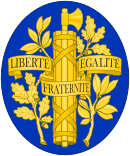
Government of France
Body exerting the executive power in France / From Wikipedia, the free encyclopedia
Dear Wikiwand AI, let's keep it short by simply answering these key questions:
Can you list the top facts and stats about Government of France?
Summarize this article for a 10 years old
The government of France (French: gouvernement français), officially the Government of the French Republic (Gouvernement de la République française [ɡuvɛʁnəmɑ̃ də la ʁepyblik fʁɑ̃sɛːz]), exercises executive power in France. It is composed of the prime minister, who is the head of government, as well as both senior and junior ministers.[1] The Council of Ministers, the main executive organ of the government, was established in the Constitution in 1958. Its members meet weekly at the Élysée Palace in Paris. The meetings are presided over by the President of France, the head of state, although the officeholder is not a member of the government.
| Government of the French Republic | |
|---|---|
| Gouvernement de la République française | |
 | |
| Overview | |
| Established | 4 October 1958 (Fifth Republic) |
| State | French Republic |
| Leader | Prime Minister of France |
| Appointed by | President of France |
| Main organ | Council of Ministers |
| Responsible to | National Assembly |
| Headquarters | Hôtel de Matignon, Paris |
| Website | gouvernement |
 |
|---|
|
|
|
Related topics |
The government's most senior ministers are titled as ministers of state (ministres d'État), followed in protocol order by ministers (ministres), ministers delegate (ministres délégués), whereas junior ministers are titled as secretaries of state (secrétaires d'État). All members of the government, who are appointed by the President following the recommendation of the Prime Minister, are responsible to the National Assembly, the lower house of the French Parliament. Cases of ministerial misconduct are tried before the Cour de Justice de la République.